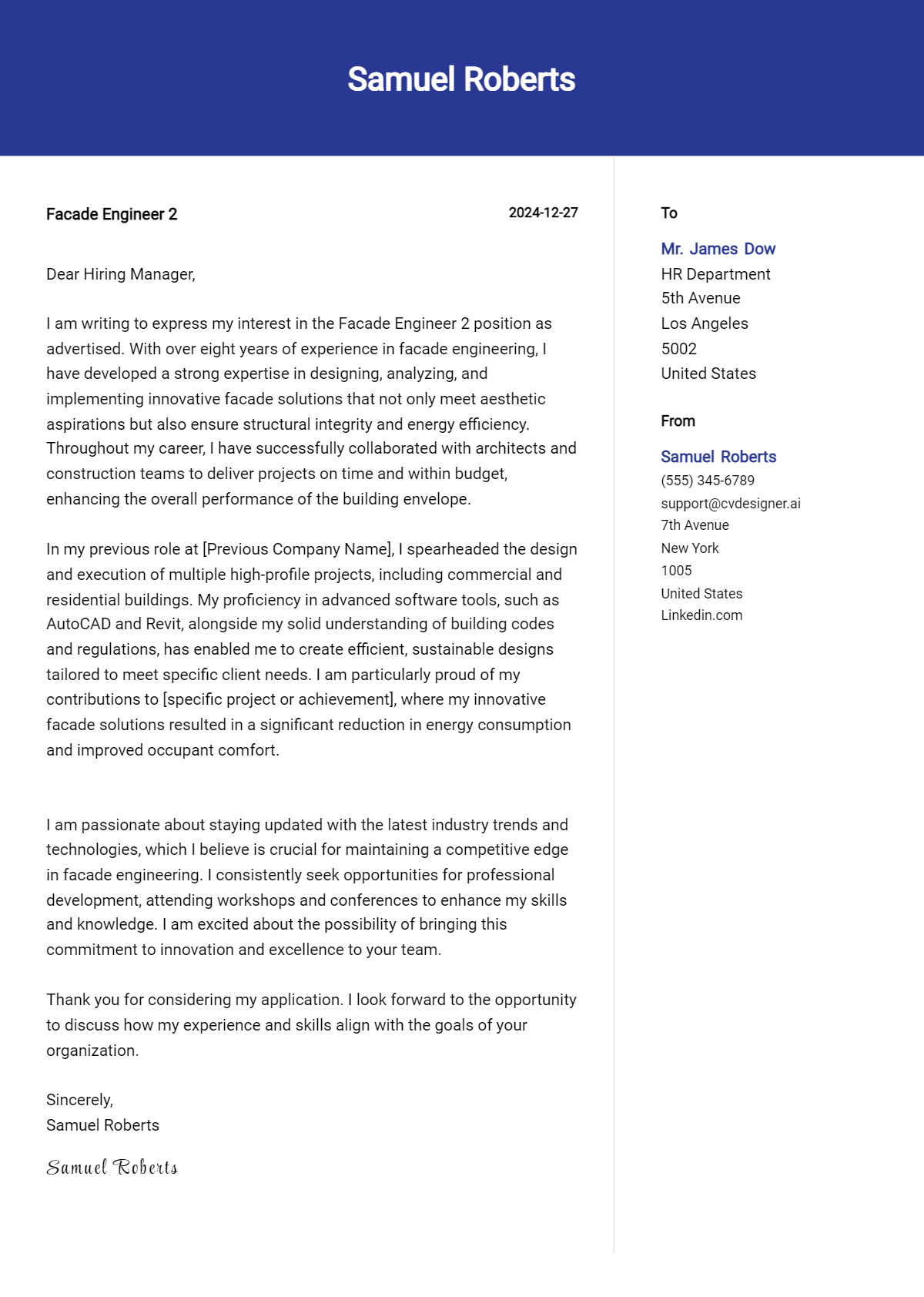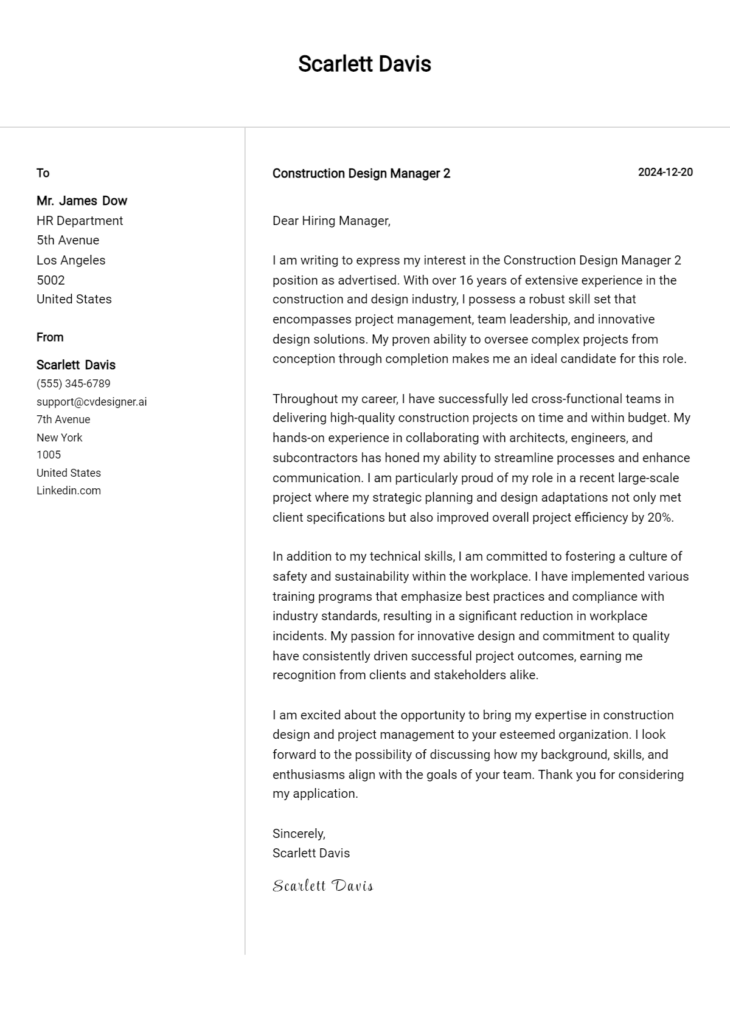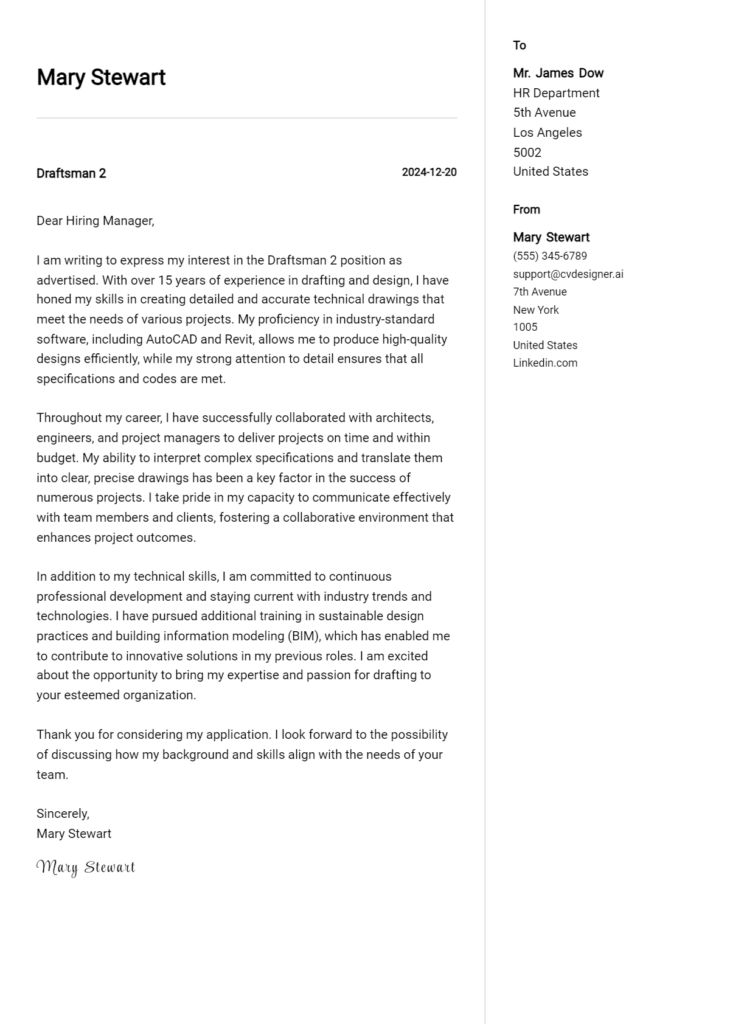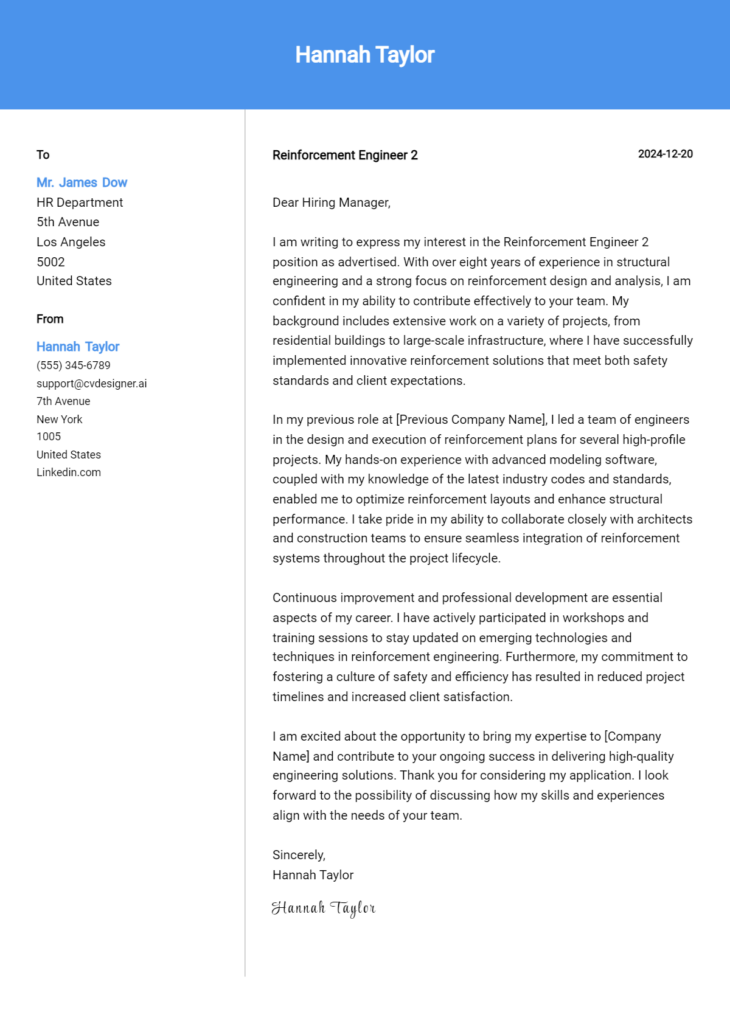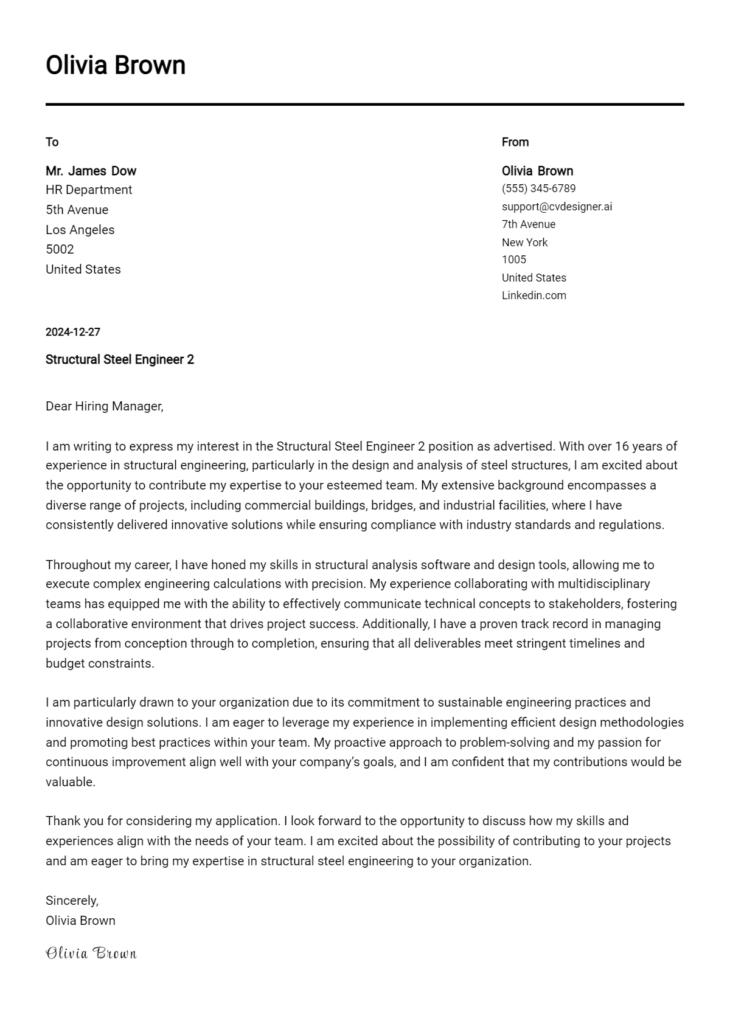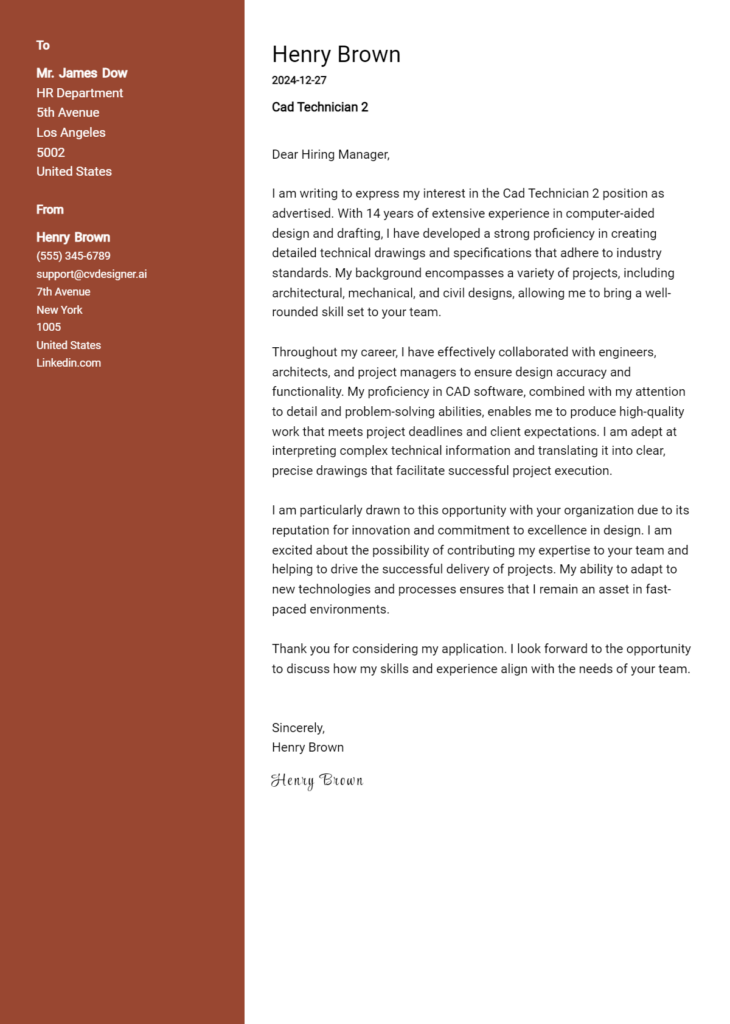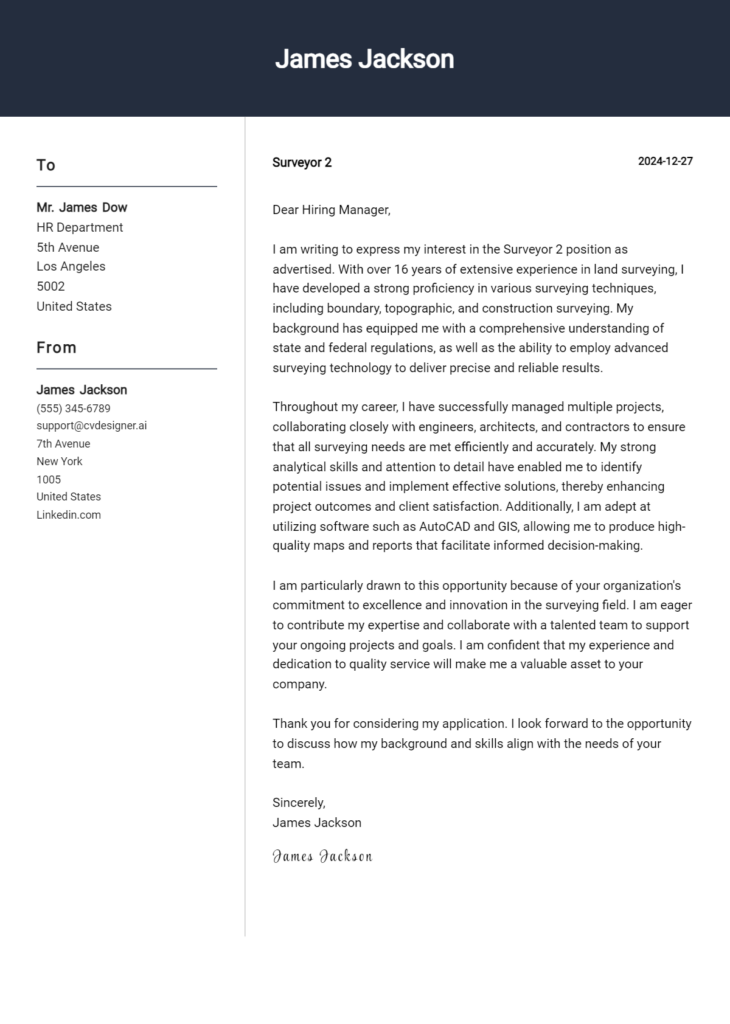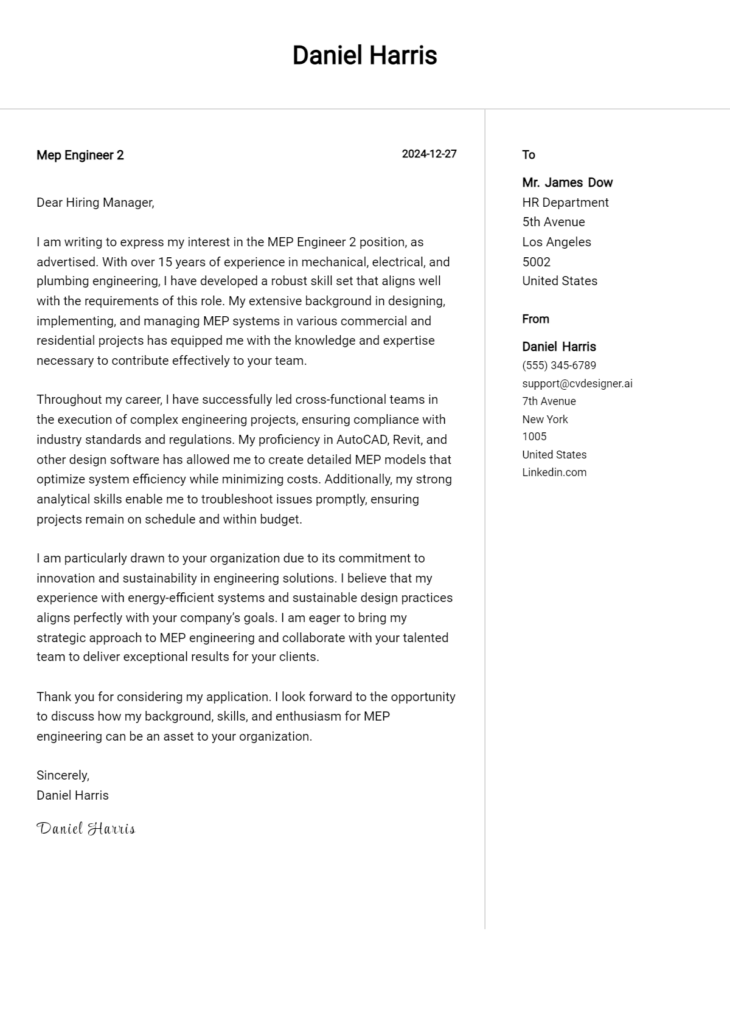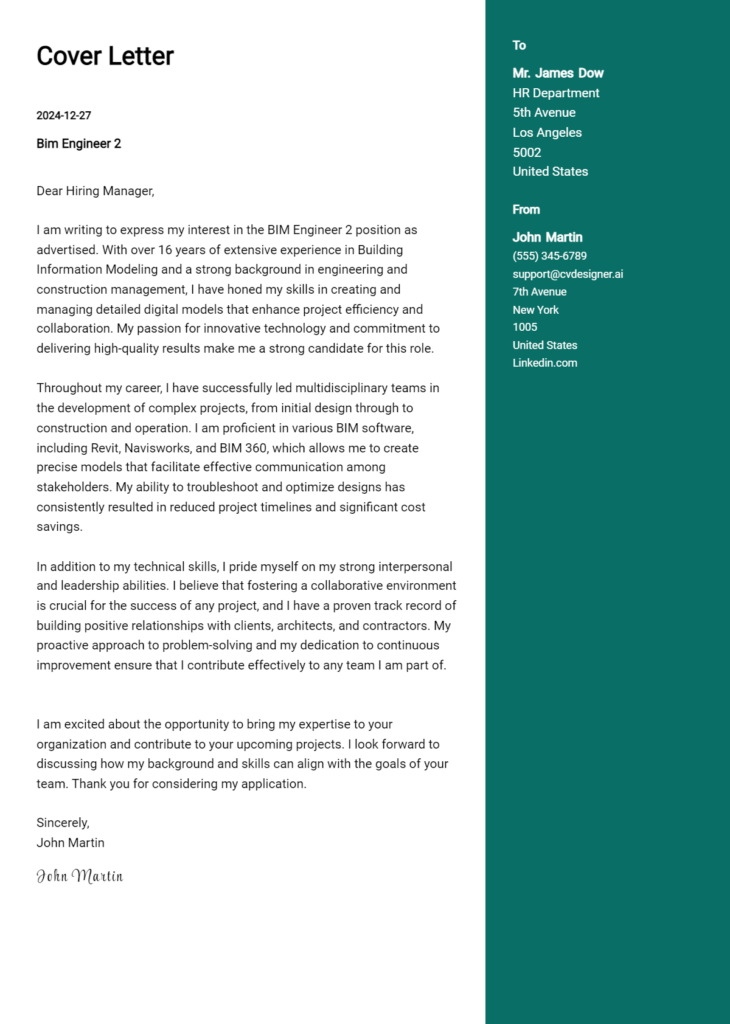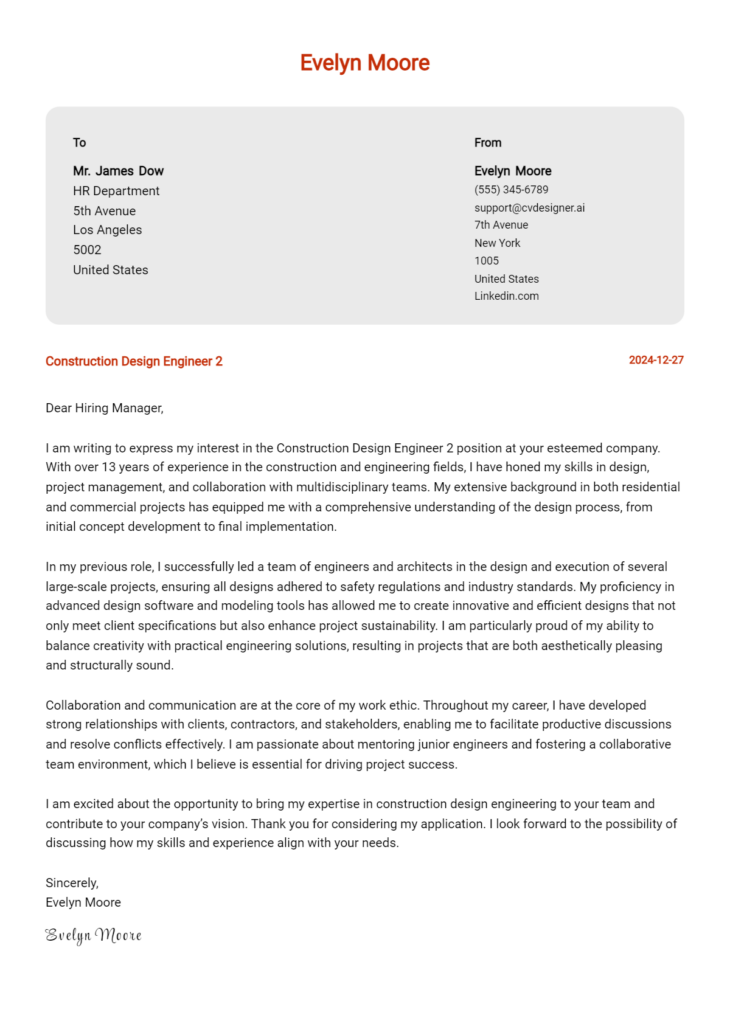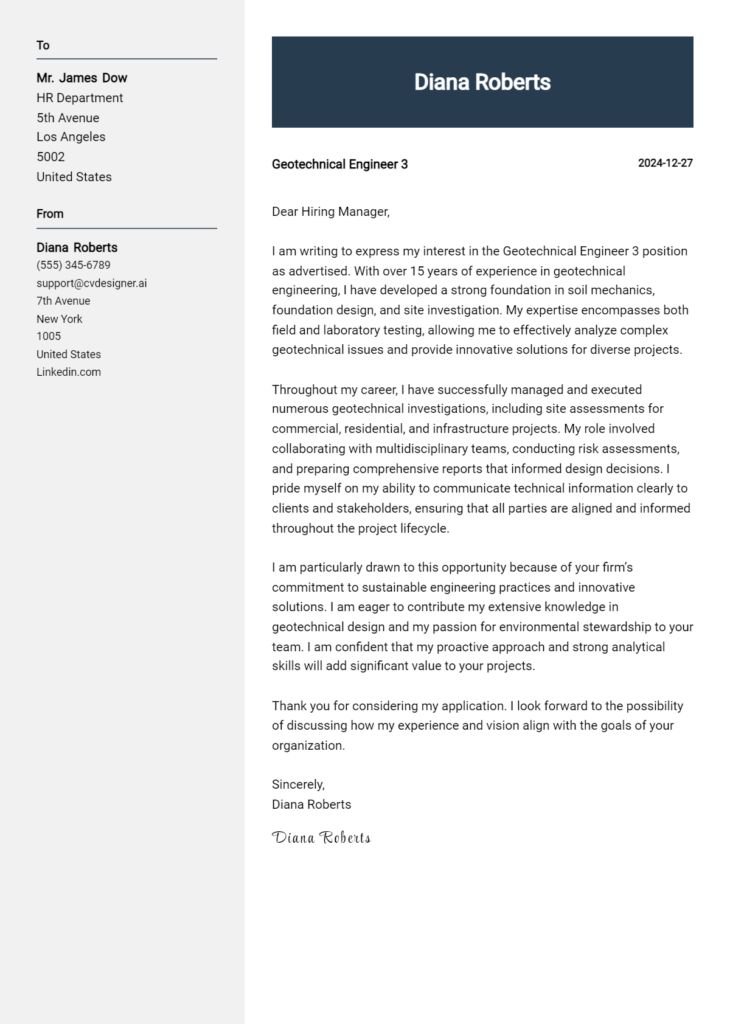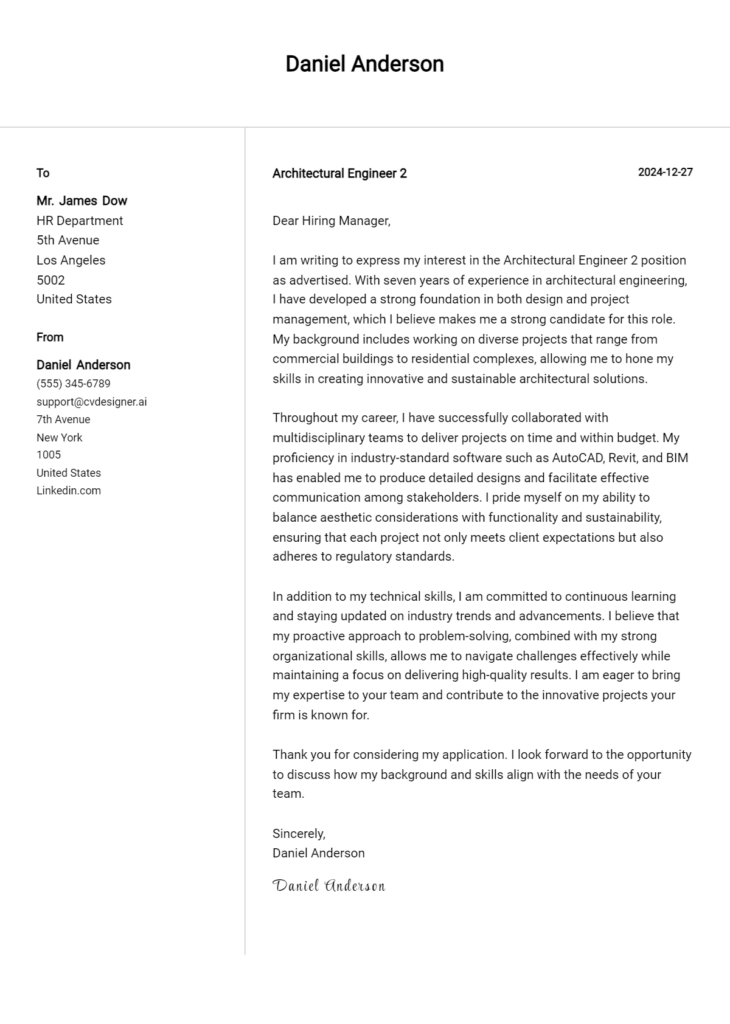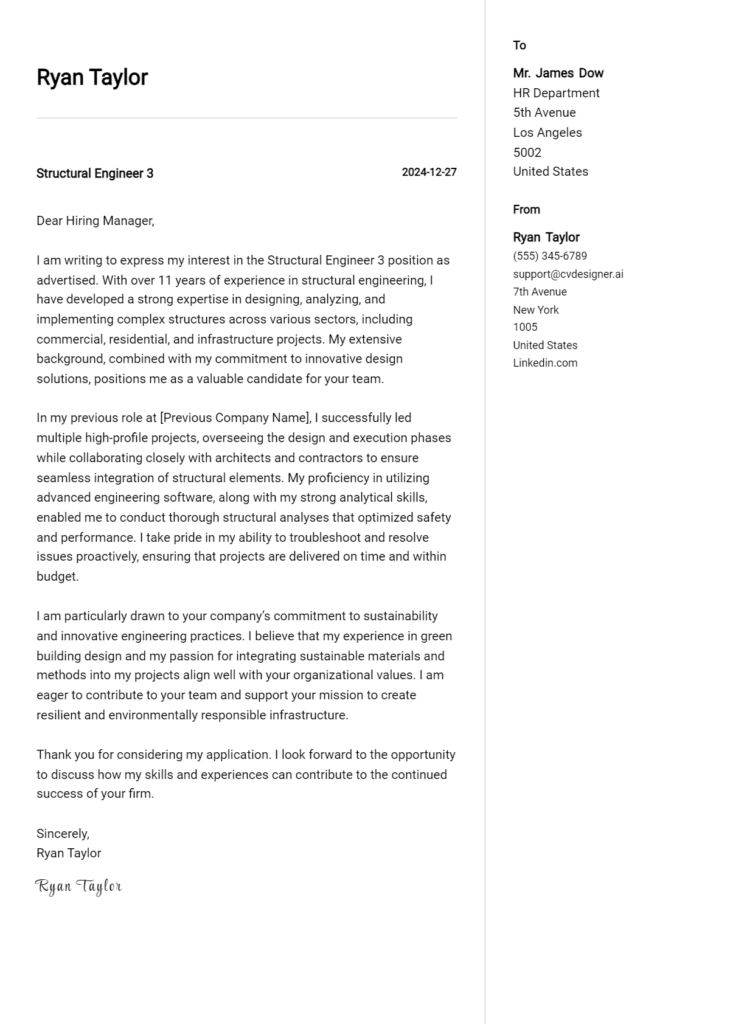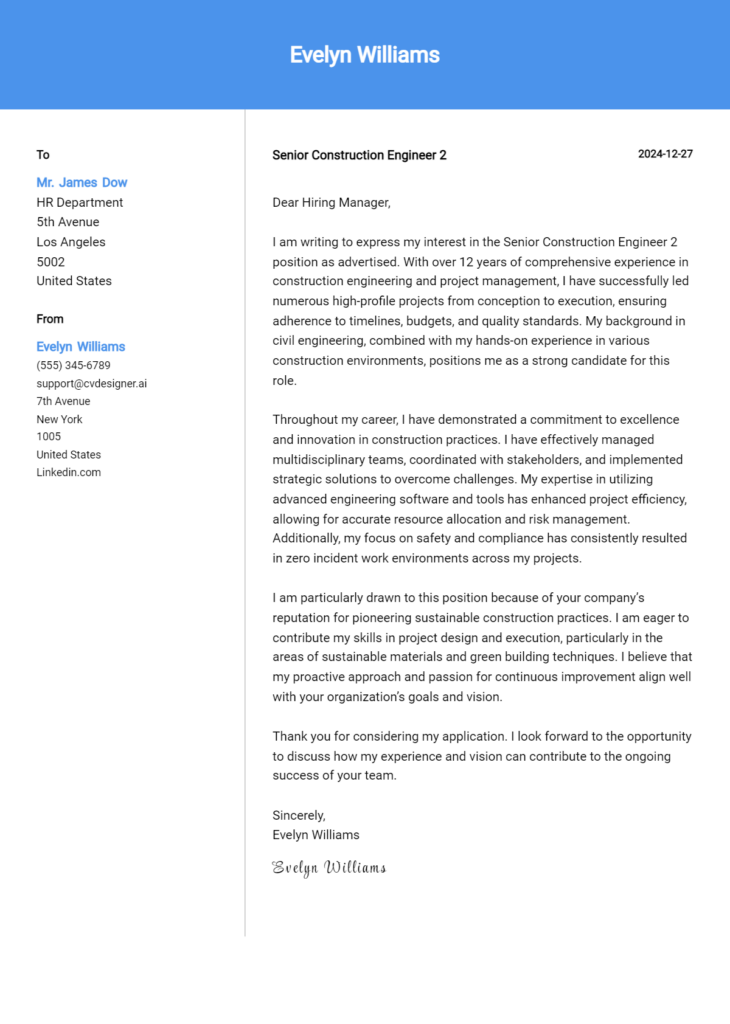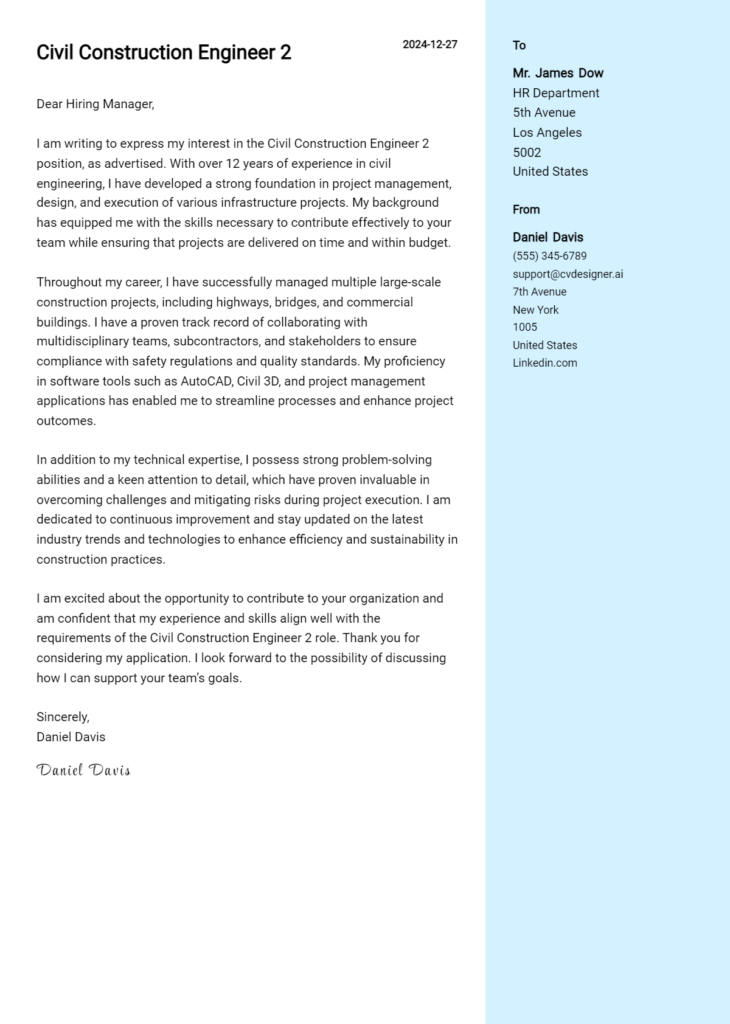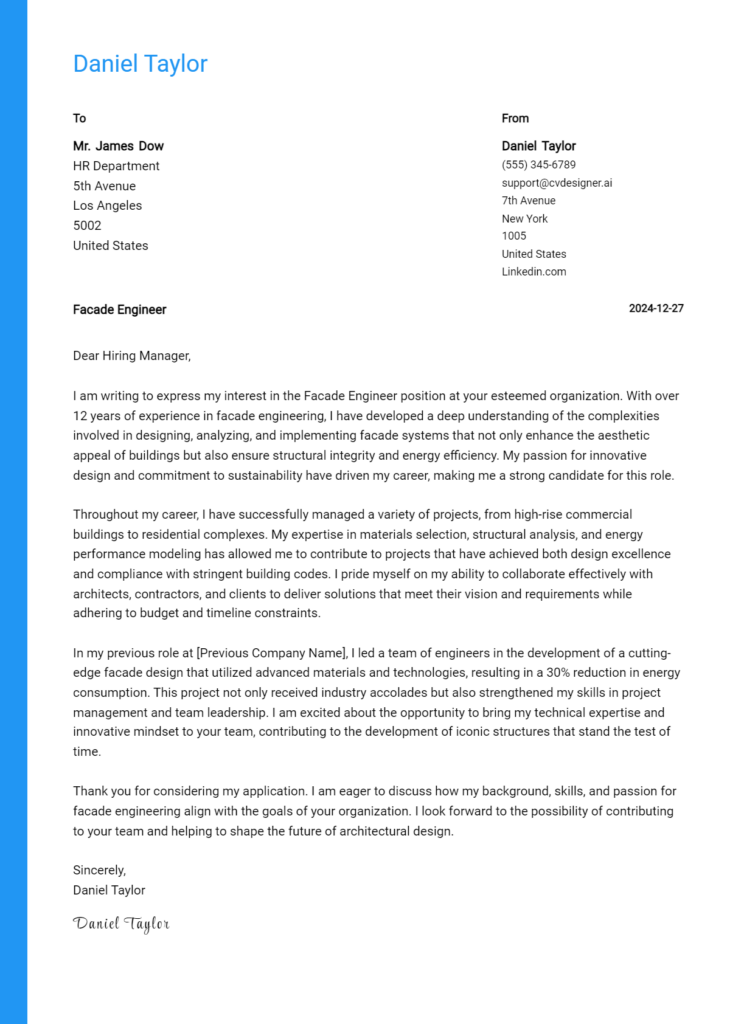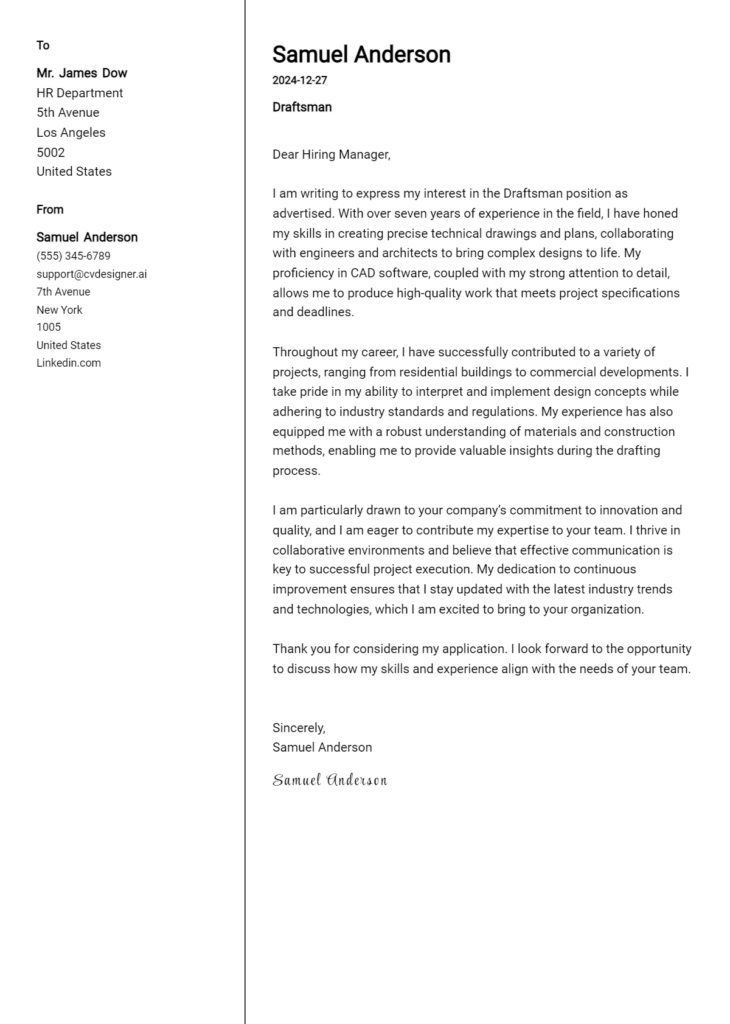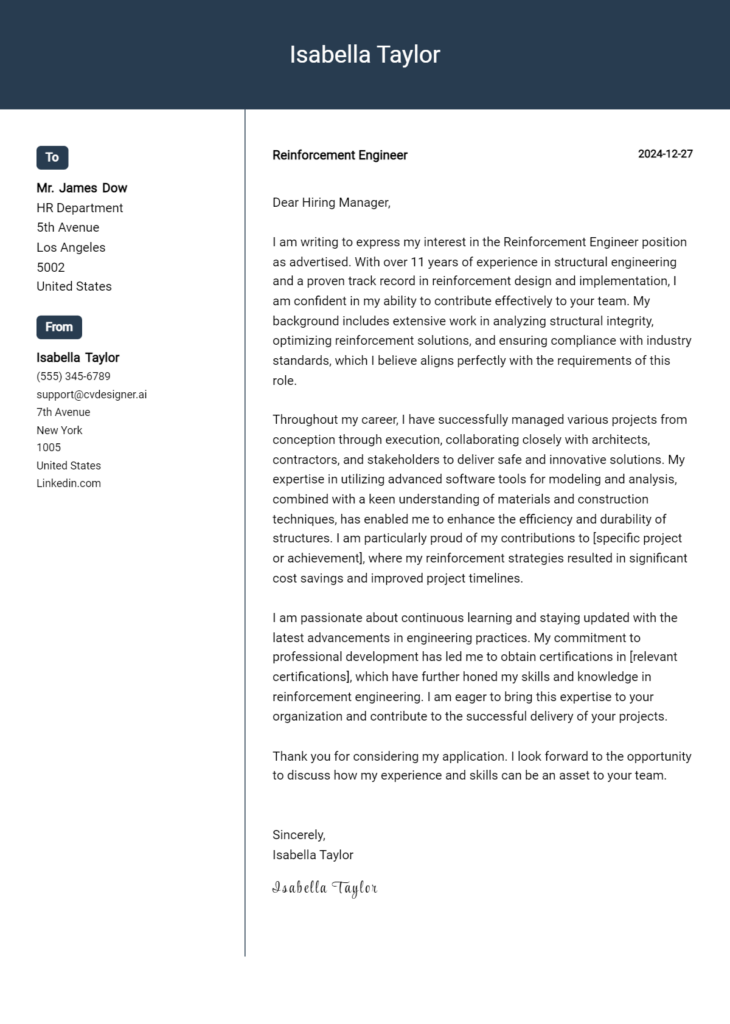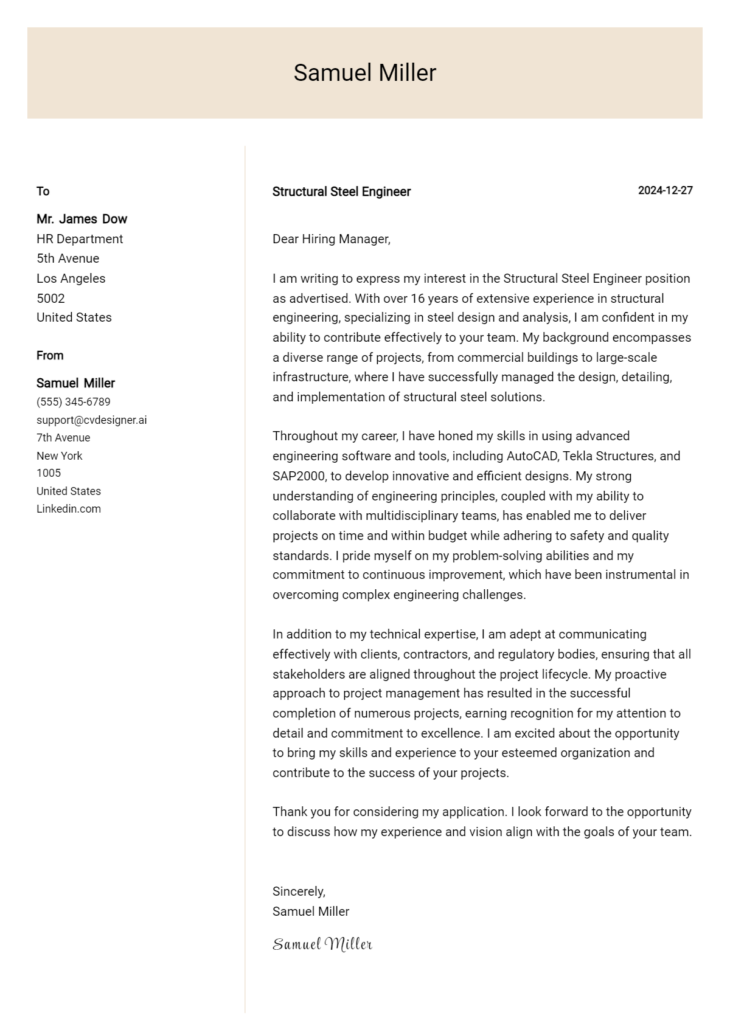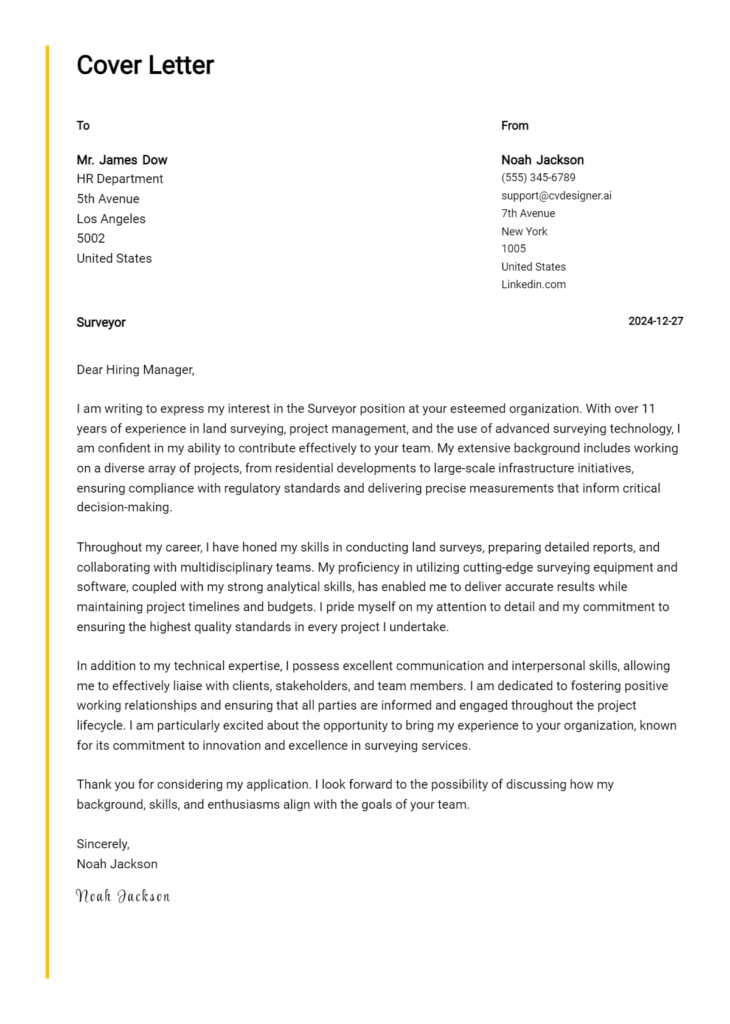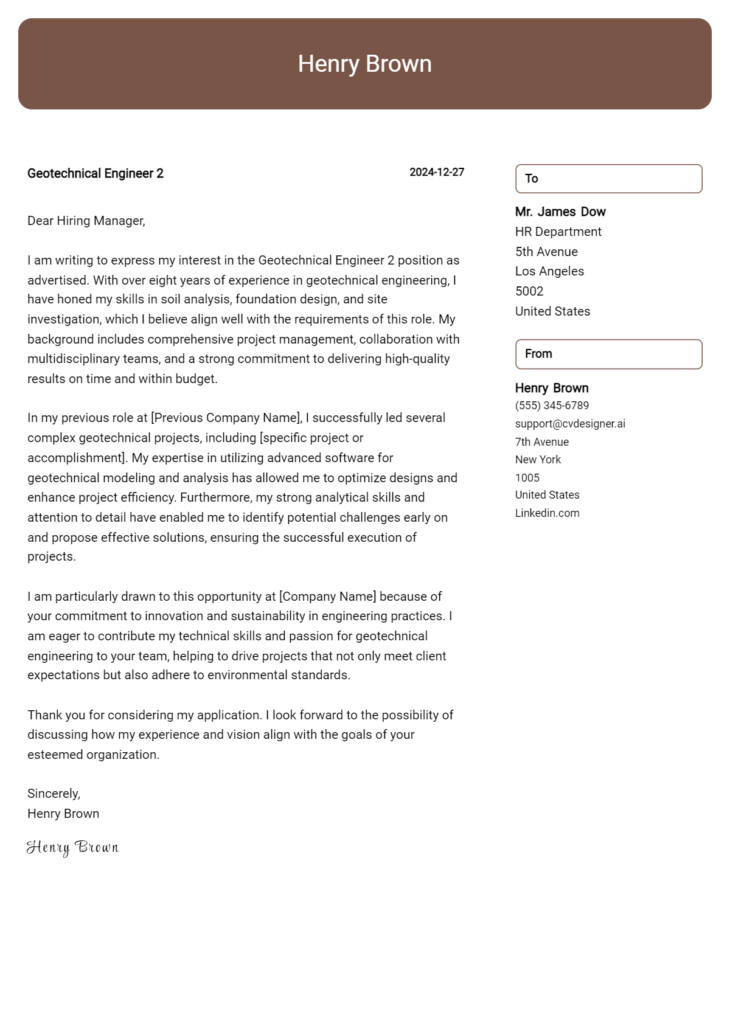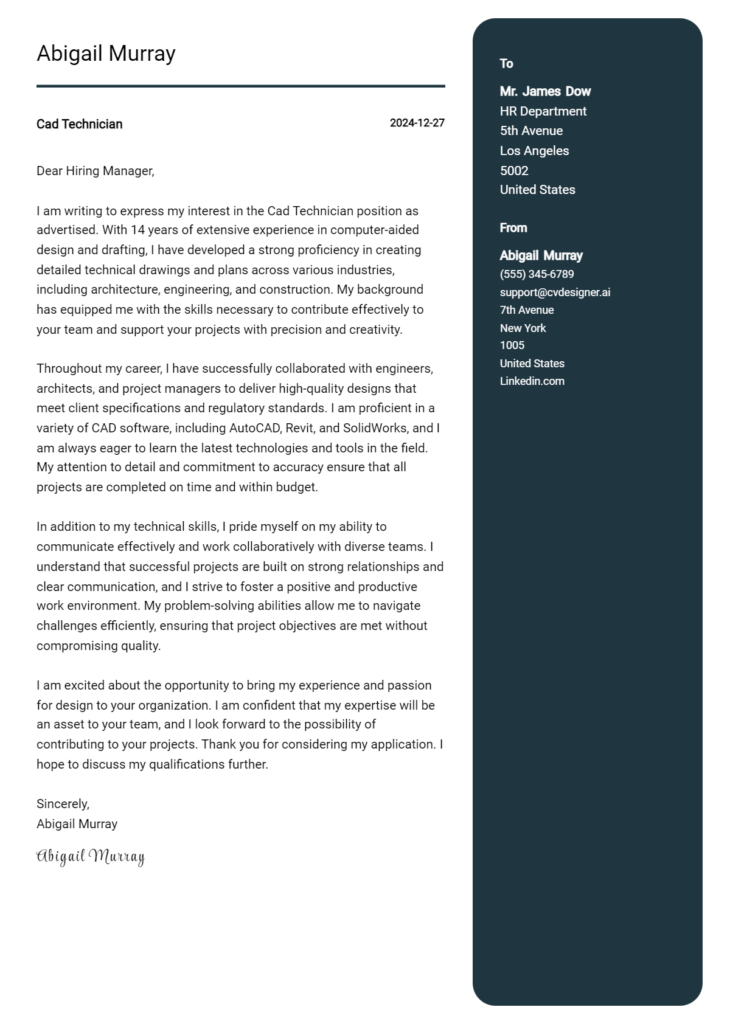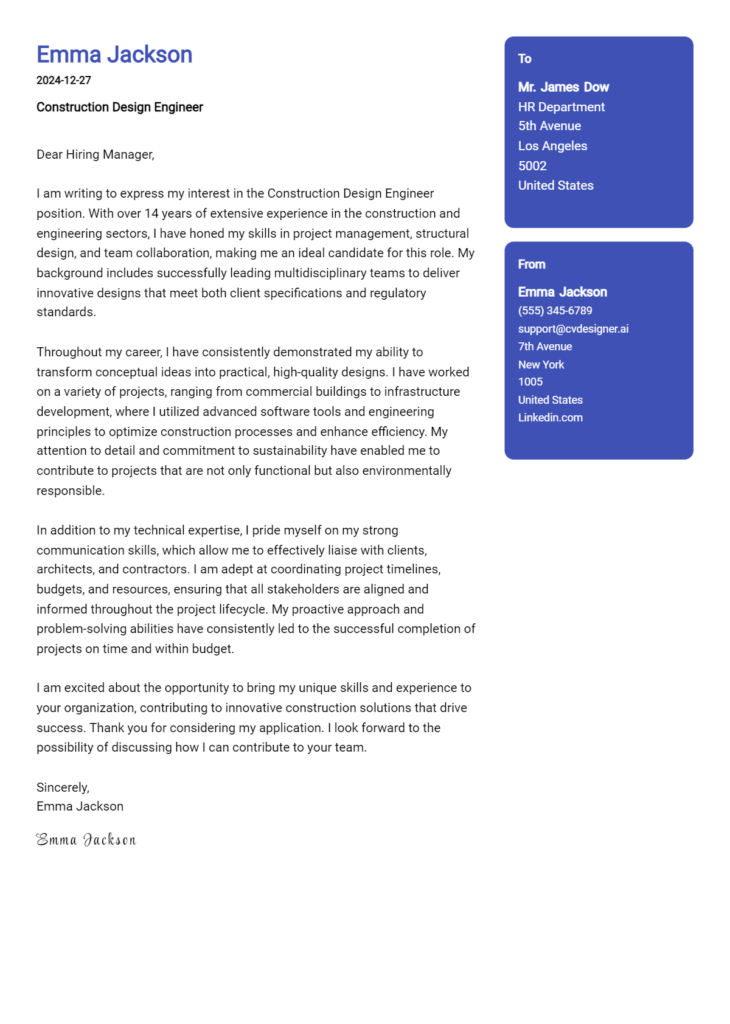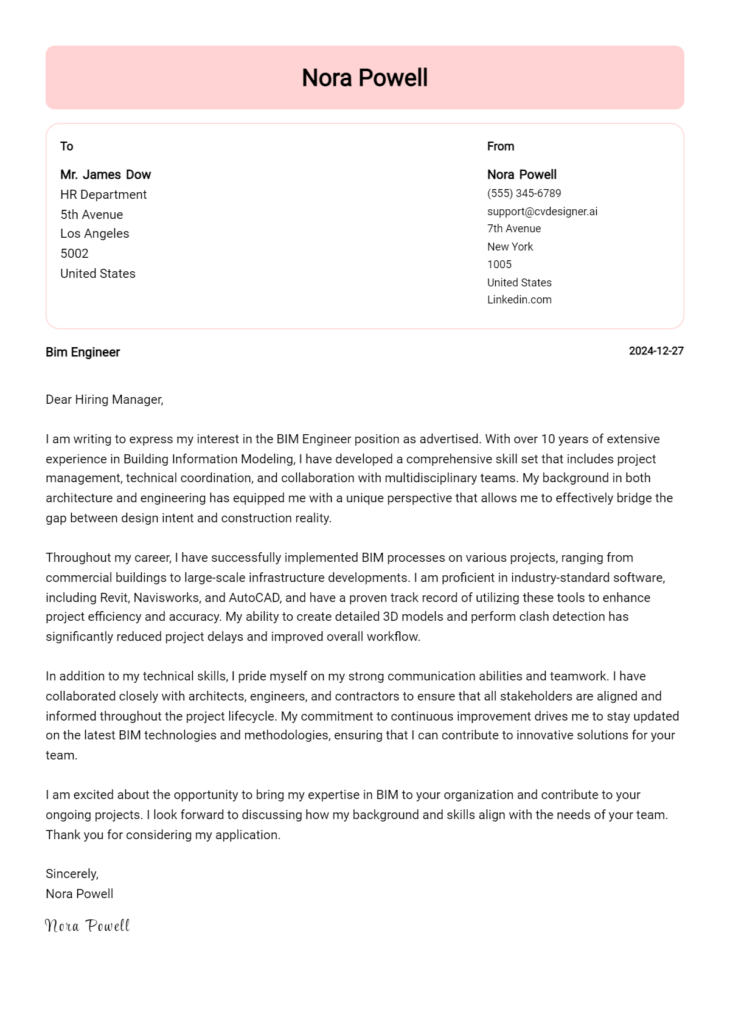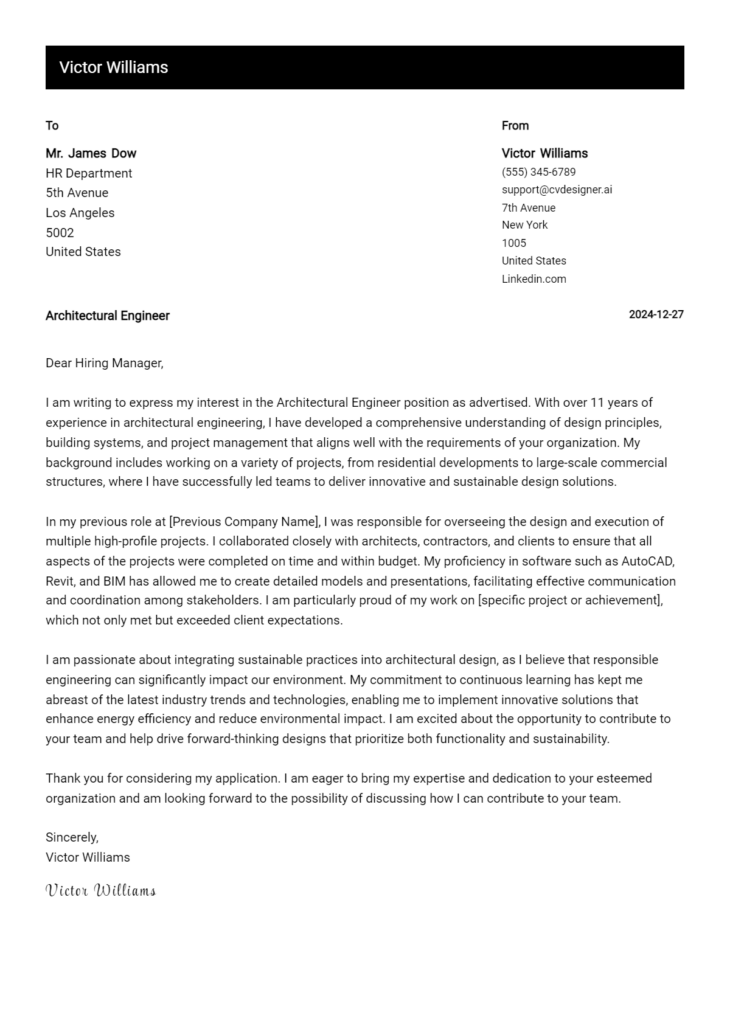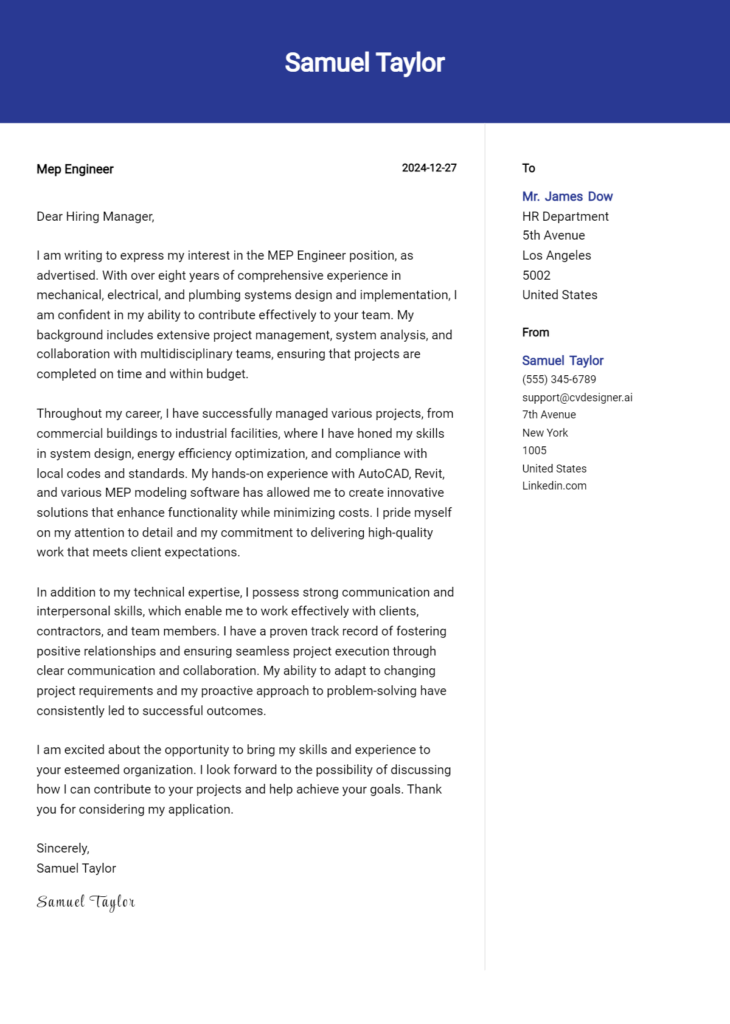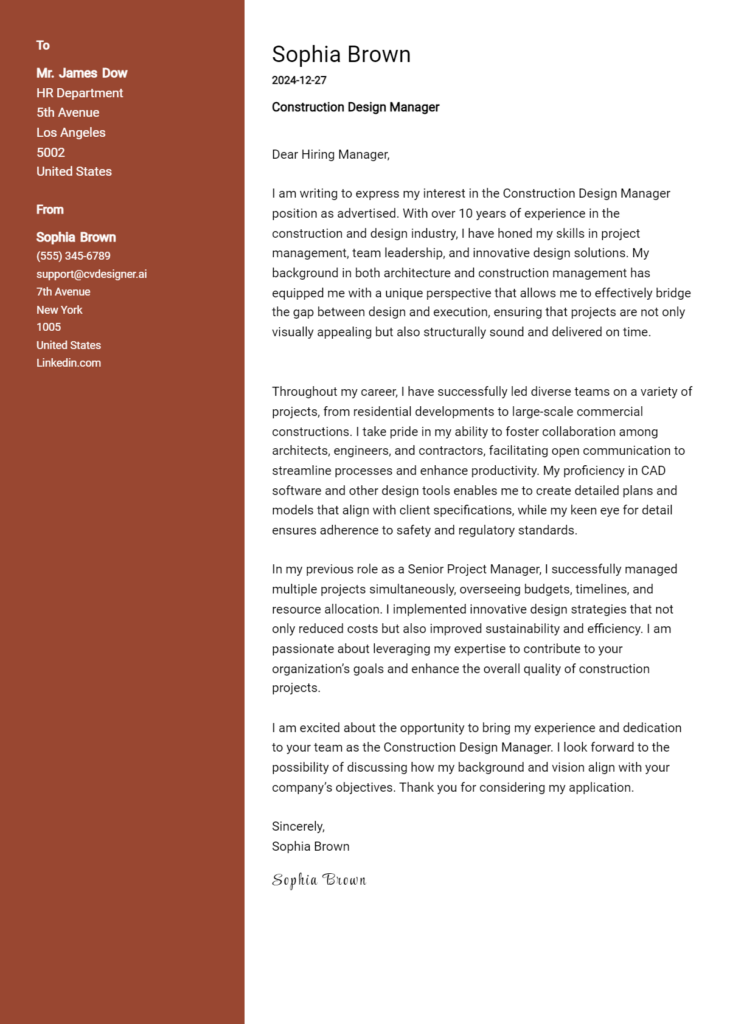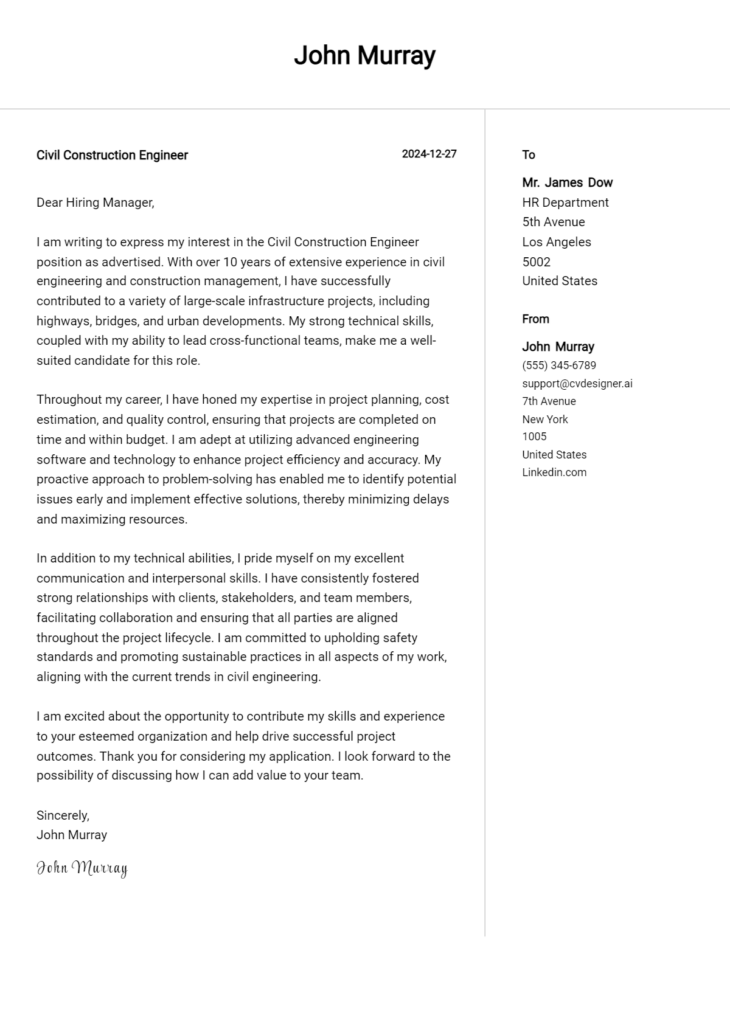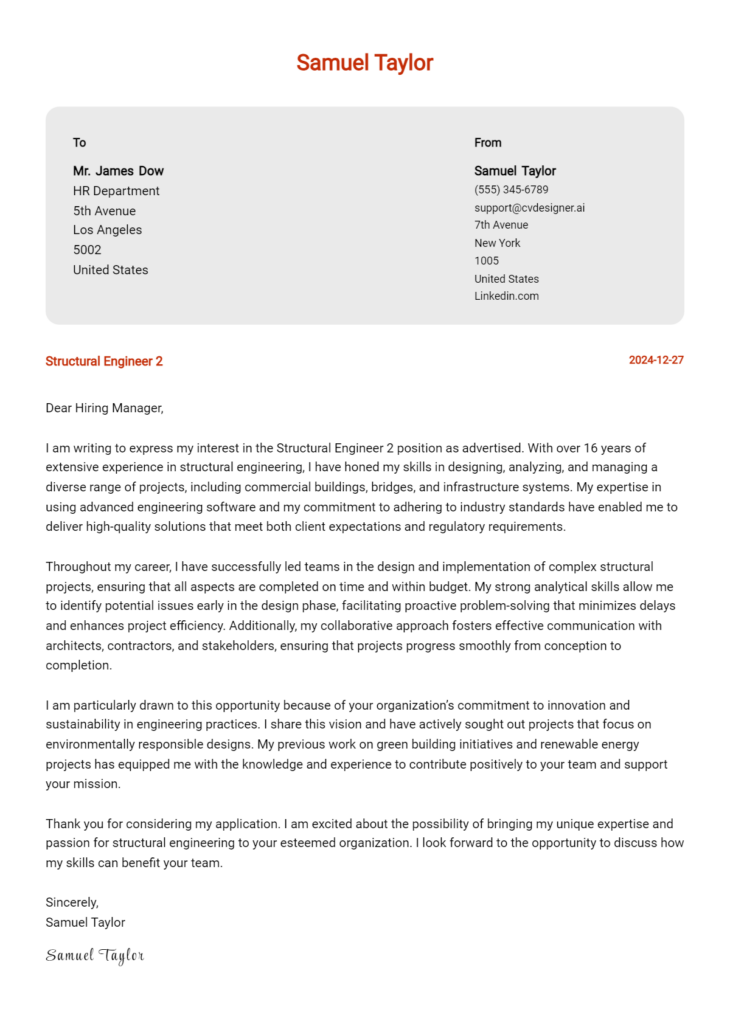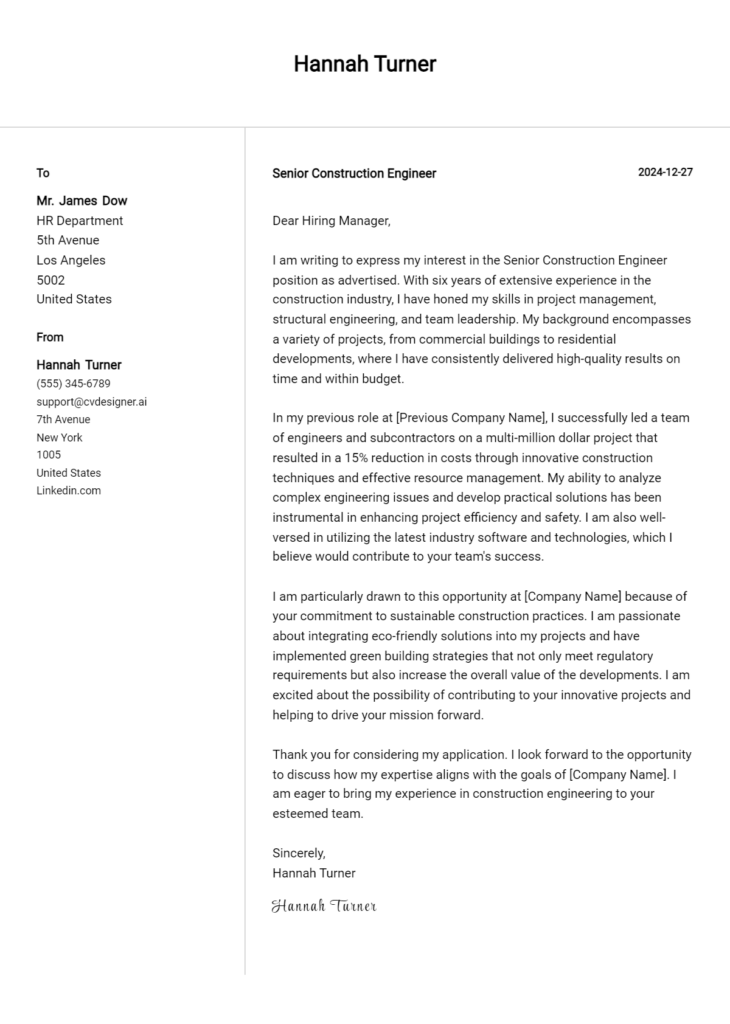Facade Engineer 2 Cover Letter Examples
Explore additional Facade Engineer 2 cover letter samples and guides and see what works for your level of experience or role.
How to Format a Facade Engineer Cover Letter?
Crafting a compelling cover letter is essential for a Facade Engineer, as it serves as your first opportunity to impress potential employers. The presentation of your skills, experience, and approach to project challenges showcases not only your technical expertise but also your ability to communicate effectively—a vital trait in the architectural and engineering fields. A well-structured cover letter captures the hiring manager's attention while clearly conveying your professionalism and attention to detail, which are crucial in facade engineering.
In this guide, we'll outline how to format your cover letter, providing insights and specific examples tailored for Facade Engineers to help you create a standout document.
We'll focus on the essential components of a professional cover letter, including:
- Cover Letter Header
- Cover Letter Greeting
- Cover Letter Introduction
- Cover Letter Body
- Cover Letter Closing
Each section is crucial for highlighting your qualifications and expertise. Let’s break down each part to ensure your facade engineering cover letter stands out.
Importance of the Cover Letter Header for a Facade Engineer
The header of a cover letter is crucial as it sets the tone for the entire document and provides essential information that establishes clarity and professionalism. For a Facade Engineer, the header should include your contact information, the date, and the recipient's details. This organization not only makes it easy for the hiring manager to identify the sender but also reflects your attention to detail—a key trait in engineering roles. A well-structured header can make a positive first impression, while a poorly formatted one can detract from your qualifications.
Strong Example
John Doe 123 Main Street City, State, Zip Code (123) 456-7890 johndoe@email.com October 1, 2023 Jane Smith Hiring Manager XYZ Engineering Firm 456 Industry Road City, State, Zip Code
Weak Example
johndoe@email.com October 1, 2023 XYZ Engineering Firm 456 Industry Road City, State, Zip Code
Importance of the Cover Letter Greeting for a Facade Engineer
The greeting of your cover letter plays a crucial role in setting the tone for the entire document. It serves as the first impression and reflects your professionalism and attention to detail. A personalized greeting demonstrates your commitment and enthusiasm for the position, showing that you have taken the time to research the company and its hiring manager. Addressing the recipient directly can create a connection and make your application stand out. To avoid generic greetings that may come off as impersonal, take the time to find the name of the hiring manager or the appropriate contact person. If their name is not readily available, you might consider using a title or department name as a fallback option.
Strong Greeting Example
Dear Ms. Johnson,
Weak Greeting Example
To Whom It May Concern,
The Importance of a Well-Crafted Cover Letter Introduction for a Facade Engineer
A compelling cover letter introduction is crucial for a Facade Engineer as it sets the tone for the entire application. This opening paragraph should not only capture the hiring manager's attention but also convey the candidate's genuine interest in the role. Additionally, it should briefly highlight relevant skills or achievements that distinguish the candidate from others. A strong introduction can create a lasting impression, making the hiring manager eager to learn more about the applicant’s qualifications. In contrast, a weak introduction can fail to engage the reader, resulting in the application being overlooked. Below are examples of both a strong and a weak introduction for a Facade Engineer cover letter.
Strong Example
Dear [Hiring Manager's Name], As a dedicated Facade Engineer with over five years of experience in designing and implementing innovative facade systems, I was thrilled to discover the opening at [Company Name]. My passion for sustainable architecture and a proven track record of successfully managing high-profile projects, such as the award-winning [Project Name], make me an ideal candidate for this position. I am excited about the opportunity to contribute to your team and drive the future of architectural design.
Weak Example
To whom it may concern, I am writing to apply for the Facade Engineer position. I have some experience in engineering and I think I would be a good fit for the job. I hope you will consider my application.
Purpose of the Cover Letter Body for a Facade Engineer
The body of a cover letter for a Facade Engineer serves as a critical platform for candidates to articulate their unique skills and experiences that align with the specific demands of the role. This section should highlight relevant projects, technical competencies, and problem-solving capabilities that demonstrate the candidate's value to the company. By presenting concrete examples of past work, such as successful projects that improved energy efficiency or enhanced the aesthetic quality of a building, candidates can effectively convey their expertise and suitability for the position. A well-crafted cover letter body not only showcases the candidate's qualifications but also reflects their passion for facade engineering and commitment to delivering high-quality results.
Strong Example
Dear Hiring Manager, I am excited to apply for the Facade Engineer position at XYZ Company. With over five years of experience in designing and implementing innovative facade solutions, I have successfully led projects such as the award-winning Green Tower, where my team achieved a 30% reduction in energy consumption through the integration of advanced glazing systems. My proficiency in BIM software allowed for precise modeling and collaboration with architects, ensuring that aesthetic and functional requirements were met. Additionally, my role in the recent City Center renovation project involved coordinating with multiple stakeholders to enhance the building’s exterior while adhering to strict budget constraints. I am eager to bring my expertise and passion for sustainable design to your team. Sincerely, John Doe
Weak Example
Dear Hiring Manager, I am writing to apply for the Facade Engineer job at your company. I have worked in construction for a few years and have done some facade work. I think I would be a good fit for the role. I know how to use some design software and have been involved in a couple of projects. I am looking for a job where I can learn more and grow my skills. I hope to hear back from you soon. Best, Jane Smith
Importance of the Cover Letter Closing for a Facade Engineer
The closing paragraph of a cover letter is crucial as it serves to summarize your qualifications, reiterate your enthusiasm for the role, and encourage the hiring manager to take the next step, such as reviewing your resume or scheduling an interview. A strong closing can leave a lasting impression and reinforce your fit for the position, while a weak closing may miss the opportunity to effectively convey your passion and readiness for the role.
Strong Example:
Thank you for considering my application for the Facade Engineer position at [Company Name]. With my extensive experience in designing innovative facade systems and my passion for sustainable architecture, I am excited about the possibility of contributing to your team. I believe my skills align well with your needs, and I would welcome the opportunity to discuss how I can add value to your upcoming projects. I look forward to the possibility of speaking with you soon and am eager to provide any further information needed during the review of my resume.
Weak Example:
I hope you think about my application. I have some experience with facades, and I think it might be useful. If you want to talk, I guess you can call me. Thanks for your time.
Creating a compelling cover letter is essential for any Facade Engineer looking to stand out in a competitive job market. Your cover letter should not only reflect your technical expertise and problem-solving skills but also demonstrate your understanding of the software development life cycle (SDLC) and your ability to work collaboratively within a team. Additionally, expressing a passion for continuous learning can set you apart from other candidates. Here are some valuable tips to help you craft an effective cover letter that showcases your strengths and aligns with the demands of the role.
Tips for Writing an Effective Cover Letter as a Facade Engineer
Highlight Your Technical Skills
When applying for a Facade Engineer position, it’s crucial to showcase your technical skills relevant to facade design and construction. Mention specific software tools you are proficient in, such as AutoCAD, Revit, or BIM software, and include any relevant certifications. This will demonstrate your capability and readiness to handle the technical aspects of the job.Demonstrate Your Problem-Solving Abilities
Facade engineering often involves addressing complex design challenges. Use your cover letter to provide examples of past projects where you successfully identified and solved problems. Discuss any innovative solutions you implemented and the positive impact they had on the project. This will illustrate your critical thinking and creativity.Showcase Your Knowledge of the SDLC
Understanding the software development life cycle is vital for a Facade Engineer, particularly when working on integrated design projects. Briefly outline your experience with various stages of the SDLC, including planning, analysis, design, implementation, and maintenance. This demonstrates your holistic understanding of project management and engineering processes.Emphasize Teamwork and Collaboration
Facade Engineering is rarely a solo endeavor; it requires collaboration with architects, contractors, and other engineers. Highlight your ability to work effectively in a team setting. Share experiences where you contributed to a team’s success, showcasing your interpersonal skills and adaptability.Express a Passion for Continuous Learning
The field of facade engineering is ever-evolving, with new materials and technologies constantly emerging. Convey your enthusiasm for continuous learning and professional development. Mention any workshops, courses, or certifications you are pursuing or plan to pursue that will enhance your skills and keep you updated on industry trends.
By incorporating these tips into your cover letter, you can effectively convey your qualifications and enthusiasm for the Facade Engineer role. For additional inspiration, consider exploring cover letter templates or using a cover letter builder to streamline the writing process.
Common Mistakes to Avoid in a Facade Engineer Cover Letter
Crafting a compelling cover letter is essential for any Facade Engineer aspiring to make a strong impression on potential employers. Avoiding common mistakes can significantly enhance your chances of success. Here are some pitfalls to watch out for:
Generic Content: Many candidates use a one-size-fits-all approach. Tailor your cover letter to the specific job and company to demonstrate genuine interest.
Lack of Technical Details: Failing to include relevant technical skills or project experiences can weaken your application. Highlight specific projects or technologies you’ve worked with, such as building materials or sustainability practices.
Poor Formatting: An unorganized cover letter can detract from your professionalism. Follow a clear cover letter format to ensure readability.
Neglecting Soft Skills: While technical prowess is important, don’t overlook soft skills like communication and teamwork. Mention how these skills have contributed to your success in past projects.
Typos and Grammatical Errors: Spelling mistakes can undermine your credibility. Always proofread your cover letter or use tools to check for errors before submission.
Overly Long Letters: Keep your cover letter concise and focused, ideally no longer than one page. Be clear and to the point about your qualifications and interest in the role.
Ignoring the Employer’s Needs: Failing to align your skills with the employer’s requirements can be detrimental. Research the company and address how your expertise can benefit them.
By steering clear of these common mistakes, you can create a polished and effective cover letter that stands out to hiring managers. For inspiration, check out these cover letter examples to help guide your writing.
Cover Letter FAQs for Facade Engineer
What should I include in my cover letter as a Facade Engineer?
When crafting your cover letter as a Facade Engineer, emphasize your technical expertise relevant to façade design and construction. Highlight your experience with materials such as glass, metal, and composites, and discuss any innovative façade systems you've worked on. It's important to mention specific projects, detailing your role and the outcomes achieved. Additionally, showcase your understanding of building codes, sustainability principles, and any software proficiency in tools like AutoCAD or Revit. Conclude with a statement about your passion for architecture and how you can contribute to the prospective employer’s goals.
How can I tailor my cover letter for a specific job?
To tailor your cover letter for a specific job as a Facade Engineer, start by carefully reading the job description and identifying key skills and experiences the employer values. Align your qualifications with those requirements by using specific language from the job posting. Mention the company’s recent projects or values, and express how your background fits with their mission. Personalizing your introduction and closing statements to reflect your enthusiasm for their projects will also make your application stand out. Demonstrating knowledge of the firm’s work will show genuine interest and effort.
How long should my cover letter be?
Your cover letter for a Facade Engineer position should ideally be one page long, typically around 300 to 400 words. This length allows you to provide enough detail about your skills and experiences while remaining concise and focused. Use short paragraphs to enhance readability and ensure each paragraph has a clear purpose. Start with a compelling introduction, followed by a body that outlines your relevant experiences and skills, and conclude with a strong closing that expresses your interest in the role and invites further discussion.
Should I include my educational background in my cover letter?
Yes, including your educational background in your cover letter is important, especially for a technical role like a Facade Engineer. Highlight your degree in architecture, engineering, or a related field, and mention any specialized courses or certifications relevant to façade design, such as sustainable design practices or advanced materials science. If you graduated with honors or received awards, include that information to bolster your credibility. Your education establishes a foundation for your technical skills, so make sure to connect it to your practical experiences to demonstrate a well-rounded profile.
Build your Cover Letter in minutes
Use an AI-powered cover letter builder and have your letter done in 5 minutes. Just select your template and our software will guide you through the process.

